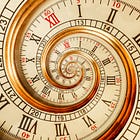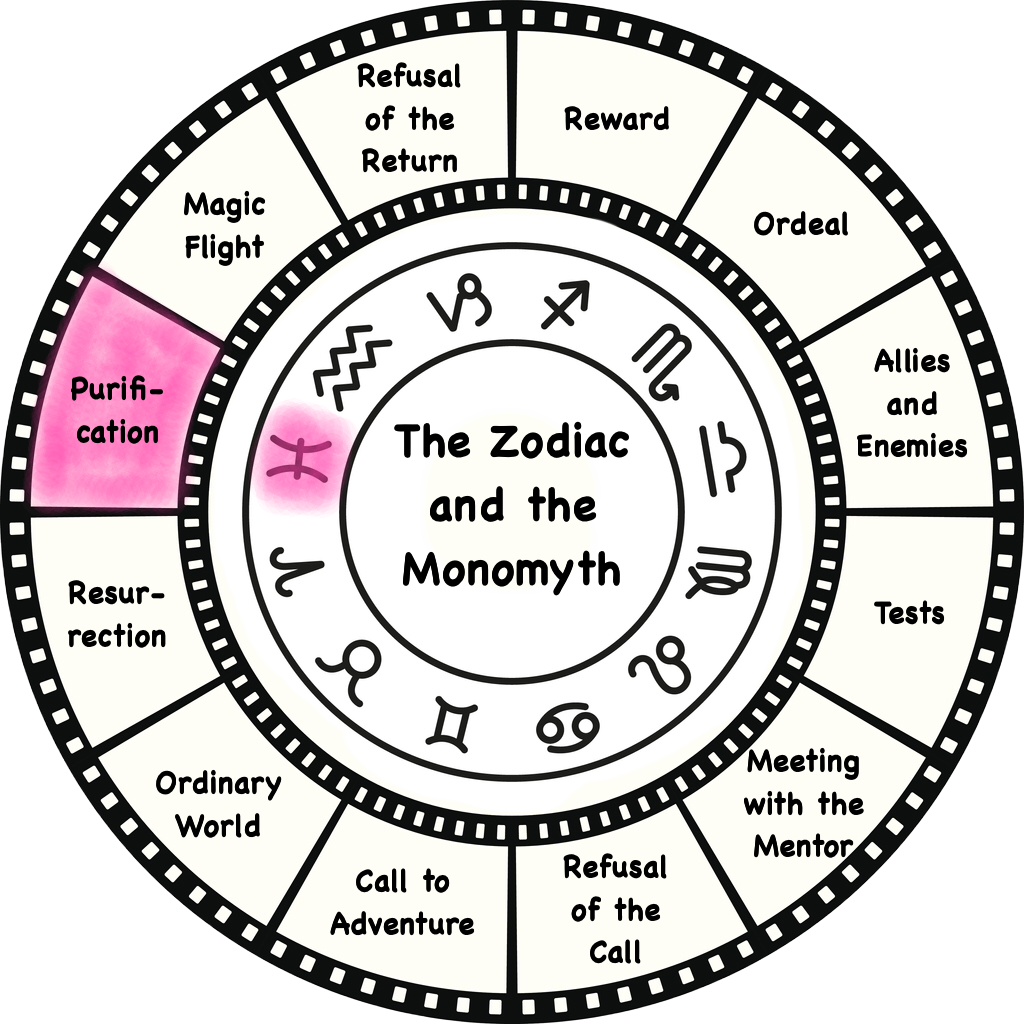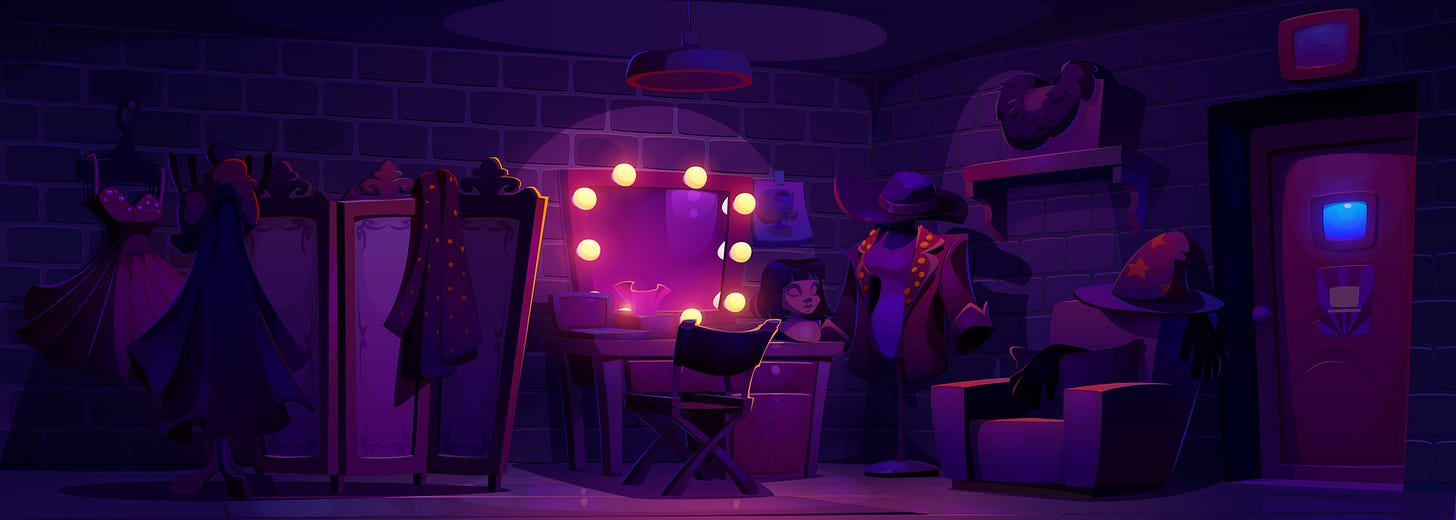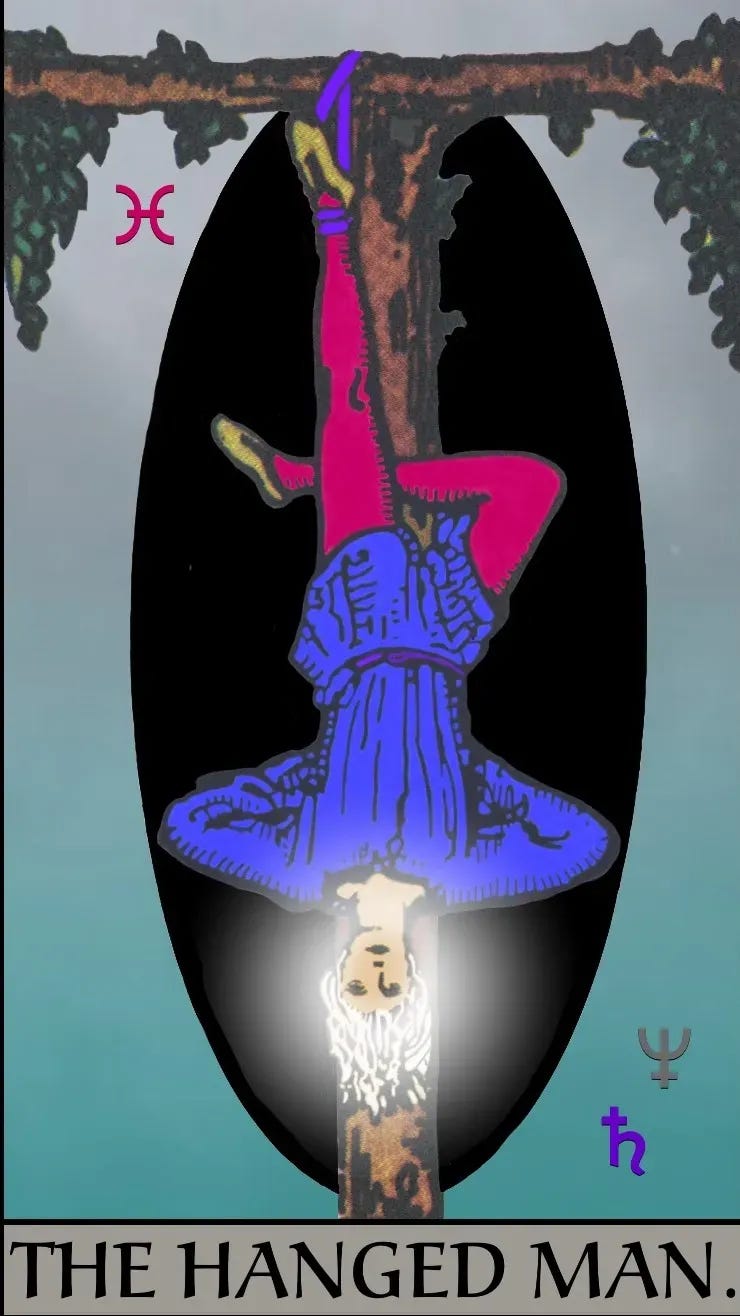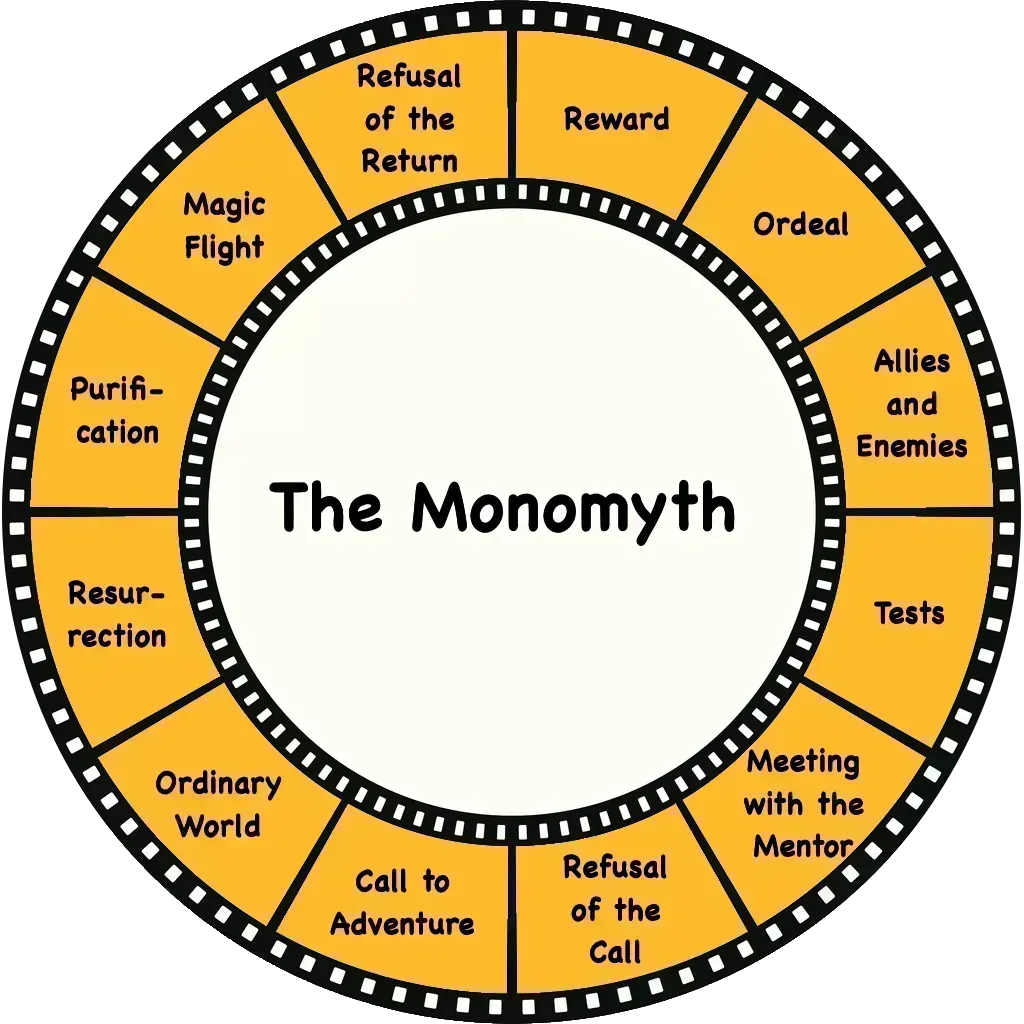Quest for the Elixir: Visions in the Dark
Purification, Pisces, and The Hanged Man
Quest for the Elixir
This post is part of an ongoing series. If you’re new to it, you’ll want to read the introduction first (about 6 minutes):
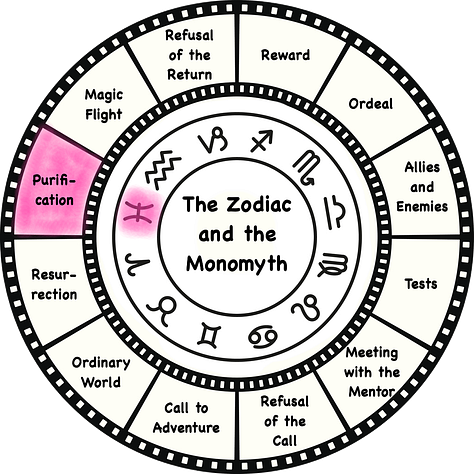

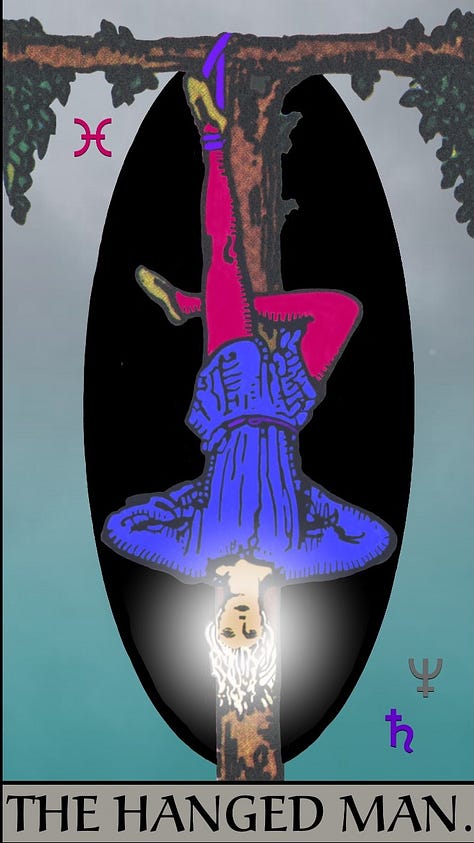
Three Articles About a Chapter of the Universal Story
Each edition of Quest for the Elixir consists of three articles about one of the 12 chapters in the cyclical Universal Story.
The first article is an exploration of the chapter from the perspective of the Hero’s Journey in Joseph Campbell’s monomyth.
The second article is a view of the same chapter in terms of the Zodiac sign corresponding to it in the cycle.
The third article is about the meaning of the chapter as symbolized in a Major Arcana card of the tarot.
During the month of the Sun’s transit through Pisces, we observe the chapter of Visions in the Dark in the Universal Story. In celebration, I offer the following three articles:
The Monomyth: Purification
This is the phase in which our universal story ends.
It’s a mysterious ending that leaves us nowhere, for the hero we’ve known is dead.
He was born in a physical body, in the obscurity of the Ordinary World. He experienced all the stages of life, his mind developing the whole time. He overcame a series of progressively difficult challenges in a Special World, the most serious crisis of which ended in a great victory and a prominent position of responsibility and power. Eventually his weakening material structure betrayed him, even as he was compensated mentally with greater creativity. He was on his way back to his home when a fatal event overwhelmed him, ending his life. R.I.P.
At this point in fiction, a final showdown, shootout, impossible choice, or some other extreme situation pushes the hero all the way over the edge and into another reality beyond. This is the climax, in which the hero is somehow fatally trapped in an impasse, forced into a transformational catharsis that ends the life he’s been living. Now the story is over, and the hero we’ve known is dead and gone forever.
Or is he? Some stories confirm that he is, his spirit somehow ‘living on’ in what remains; in others he’s absent (for anything from a poignant pause to many years), subsequently to reappear in a transformed state. Maybe he’s gone into a hospital, a prison, a religious order, or obscurity in a faraway country. Sometimes the hero only pauses for a moment of reflection before making a significant decision that he never would have made before. In any case, he’s been “somewhere else”, and he’s no longer the same. In the movies, a purifying transition from an abandoned life to a new one yet to unfold is often shown as an ocean voyage.
So what’s the purpose of the absence? In The Writer’s Journey, Christopher Vogler points to the customary quarantine of ancient hunters and warriors before they could return to their ordinary communities. Because they had blood on their hands, they needed first to be cleansed and purified of the odor and aura of death. I would add that even without blood on our hands, between our days of stressful adventure in life, we all need to withdraw into nightly periods of cleansing, refreshing sleep. As a bath in a sea of salt water cleanses our bodies of dirt, so a bath in the sea of dreams cleanses our souls of useless leftover mental and emotional clutter.
"Whenever we touch nature we get clean. People who have got dirty through too much civilization take a walk in the woods, or a bath in the sea. Entering the unconscious, entering yourself through dreams, is touching nature from the inside and this is the same thing, things are put right again." — Carl Jung
What else do all of the examples have in common? They are all removed from society and the collective story to an in-between place of isolation in which they are not involved with any activity. Their past was whatever it was, they learned whatever they learned, and it changed them however it did. If given an opportunity they would live differently, there is, for the present, no opportunity. There is only rest and purification.
Beneath the level of the story, there is another interesting perspective to be found in this storyless interlude. It’s that of the stage play as a metaphor for life.
All the world's a stage
And all the men and women merely players;
They have their exits and their entrances,
And one man in his time plays many parts…
If the story we’ve been following is ultimately the equivalent of a stage play, the hero has always been a mere character played by an actor totally immersed in his role.
From that perspective, let’s look back on the most recent phases of the universal story:
In “Refusal of the Return”, after a long and tedious effort, the actor had finally mastered his role as a hero in the current play. He identified completely with his role, believed it and played it to the hilt, enjoyed his control of it, and wanted to reinforce whatever supported it, as did, apparently, everyone else. He ‘was’ his character. The play was his world, and it ran for some time.
In “The Magic Flight”, enthusiasm and support for the production began to be withdrawn. A ‘crack’ appeared in the structure, which then began to crumble. The play proceeded as usual, but the hero and some others occasionally broke character and the “fourth wall” supporting the fantasy. The message was “Of course you realize that this is all fake! Stop believing this stupid play, and start believing in yourselves as human beings!”. Where the objects of belief and disbelief were flipped, the ‘spell’ was broken.
Indeed the play wasn’t real, but the actors were, and those who found themselves unfulfilled in their roles were remembering their option to stop giving their energy to a bad play and find or write a better one. In a shocking development, the “hero” walked out (or was fired) and had to be replaced. If enough others were equally unfulfilled in the production, the whole show folded.
By the time we arrive at the phase of “Purification”, the “hero” character is dead and gone from the stage. For the actor who had inhabited the role, the shattered fragments of the play that had seemed so real are dissolving altogether.
Does anything remain? Oh yes, of course. After his death scene, the actor who had played the hero retreats to his private dressing room to shed his hero costume and wash off all his makeup. There, a bookshelf holds copies of all the plays he’s done, and a rack holds all the costumes he’s worn. But he is not now in any play. He has only the effects of his past experience and his imagination. There is nothing for him to do but rest, contemplate, peruse some new scripts or pick up a pen, and imagine what he might do next.
"Life has always seemed to me like a plant that lives on its rhizome. Its true life is invisible, hidden in the rhizome. The part that appears above ground lasts only a single summer. Then it withers away—an ephemeral apparition. When we think of the unending growth and decay of life and civilizations, we cannot escape the impression of absolute nullity. Yet I have never lost a sense of something that lives and endures underneath the eternal flux. What we see is the blossom, which passes. The rhizome remains." — Carl Jung
The prospect of suspense from Time’s story in a state of timelessness prompts wonder and questions. Is this the position of a soul whose physical body and earthly role have been washed away like sandcastles in the tide? If so, what are the implications?
Nothing about that mystery is provable, but we have our beliefs. Some believe that the ‘theater’ of life is a thoroughly evil trap into which we should regret ever having wandered. If life on earth is nothing but an endless round of illusions, they reason, we’re all basically ‘running on a stupid hamster wheel’, and what’s the point? Their conclusion is truthful from a logical perspective, but that’s not a perspective from which the point can be grasped.
Logical thinking can perceive the sequence of events and associated feelings, and may observe that it unfolds in cycles like a wheel. But the ‘wheel’ has a ‘hub’ of Power and Light to which thought alone is blind. The equally real human function required to perceive the ‘hub’ is intuition, which works by laws of its own.
In my view, this bittersweet ‘theater’ experience on a ‘hamster wheel’ is necessary for the development of intuition and spiritual growth. The cycles are purposeful, because our awareness and perspective are deepened and refined with with each cycle we experience. If not for these cyclical ‘tours’, we wouldn’t develop awareness at all. Day by day, month by month, year by year, life by life, the turning of the Wheel generates LIGHT within us, in which we gradually find authentic alignment with our Source.
Does the soul ever have any option other than the assumption of another role in yet another cycle of the monomyth? I believe that if/when we are ready to ‘quit the theater’, we’ll know what our options are. In the meantime we grow wiser and happier in the monomythical circle dance that spirals around the Center. And at this point in every cycle, we each experience on some level the perspective of a formless soul, purified in solitude and dreams. Like a maskless actor between plays, we prepare for a challenging new role in a new costume, as a hero in a brand new upcoming story.
This is the phase in which our universal story begins.
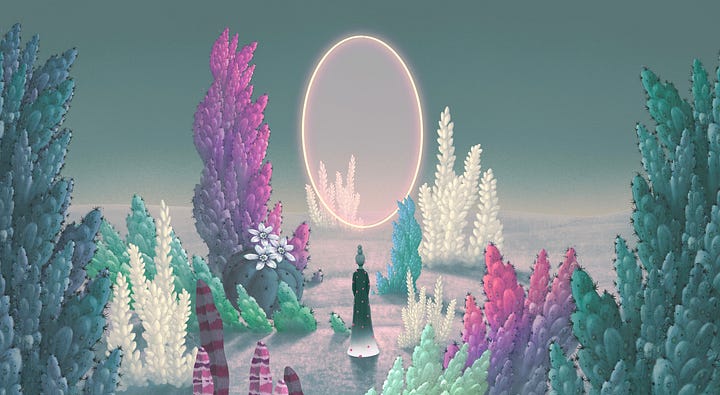

Pisces
The Water signs in the Zodiac are all about feelings and attachments, and there are three of them. The water cycle is a good metaphor for the way they function.
Cancer is comfortably attached to the familiar feelings and regular routines that carry it along on the constantly flowing river of life.
Scorpio, at the mouth of the river, witnesses the end of the flow and its dissolution into the sea or lake, as the pain of inevitable loss forces it to let go of familiar attachments and to reconsider values.
Pisces is among the ‘lost’ in the ocean or lake, where old, outworn forms and feelings are washed away. Meanwhile, like a cloud formed as ocean water evaporates, new feelings and forms are gathered in Piscean dreams. By this natural ‘distillation’ process, the ‘cloud’ will eventually grow heavy, and in time the fresh water will be released in a ‘cloudburst’ to flow again in the river of life.
Pisces is a seeker of tranquility and peace in which to dream. Pisces’ developing feelings are acutely sensitive, often psychic and empathetic, able to identify with anyone’s emotional state. Its need for a buffer between itself and the world makes it adept at concealment and camouflage. From the Pisces perspective, “life is a masquerade”. Its style is the protective way of a chameleon, which is whatever appearance works best in the current situation, i.e. some sort of disguise. While the Fire sign Leo is the most impressive and showy, the Water sign Pisces is the real actor of the Zodiac.
In an astrological chart, houses represent the various ‘departments’ of life, and the places where they function. The natural house of Pisces is the 12th, located in the left part of the chart, as highlighted in the above diagram. It’s the house where things are hidden from public view, a sort of ‘closet’ that contains things out of sight. A person may or may not be aware of the contents of the 12th house in his/her natal chart.
As a physical place, the 12th house is any place where one is hidden in isolation and solitude, and missing from external life. The isolation may be voluntary, as in a monastery, convent, or any peaceful haven where one retreats from the stresses of the world. Or it can be involuntary, as in confinement to a hospital, prison, or some sort of trap. In any particular chart, the sign on the 12th-house cusp further describes the type of place it is.
Neptune is the “modern” planetary ruler of Pisces, from which its otherworldly characteristics are derived. It’s the original Watery power of imagination that ‘garbs’ ineffable spiritual energies in malleable forms.
Neptune acts to hide or camouflage things, or to glamorize them so that they seem numinous and “larger than life”. It’s strongly associated with dreams, photography, films and videos, where what we see is not physically there and could be distorted or artificially enhanced.
Neptunian objects include things evocative of fantasies or visions, as well as borrowed items and substitutes standing in for “the real thing”. Neptunian people include all types of mystics and artists, as well as clowns and others whose appearance is somehow artificial.
Where Neptune is, there is probably either a blind spot or ‘grey fog’ where most of us don’t see what is there, or an illusion that is somehow not what it appears to be. That could be a good thing or a bad thing.
It’s wonderful when we recognize it and appreciate it for what it is. In art and spirituality, it weaves numinous spells around concepts and experiences that can’t be communicated in words, allowing us to feel and relate to them more directly. In our dreams it imparts spiritual guidance in its mysterious, mystical way. It gives us visions of as yet unrealized potentials, encouraging faith that they will indeed manifest “someday, somewhere”. Neptune is the original “fairy godmother” (Bibbidy bobbidy boo!), and the deceased “real mother” the fairytale heroine misses while having to deal with her oppressive “wicked stepmother” (negative Saturn).
Negative Neptune is sneaky and stealthy. Although at first it may appear to be a lovely dream, sooner or later it morphs into a nightmare. Confusion of illusion with reality makes us vulnerable to malicious deception, projection of false attributes on innocent others, mistaking potentials for facts, and other destructive errors in judgment. Negative Neptune is associated with the harmful effects of drugs, alcohol, poisons, pollution, and lies. Truth is the antidote — the sooner discovered and applied, the better.
Jupiter is the “classical” ruler of Pisces, recognized as such before the discovery of Neptune. Its Fiery, expansive influence is the joy within the poignancy of Watery Pisces. For the Piscean ‘ocean voyage’ is truly a purification. As the obsolete details of our old story are ‘washed’ away, our essential soul with its freshly refined perspective is relieved and liberated, joyful in bright visions, already on its way to a better, happier story somewhere new.
The Hanged Man
The tarot Hanged Man hangs by his left foot, which is tethered to his tree by a cord. The cord is his Fate, made in his past, that drew him here and binds him now. Providence leaves his right foot unbound, to choose his future steps by free will. But his walk has been suspended. His legs are crossed, suggesting his current position at ‘crossroads’, not walking any path, but poised for detached contemplation of possible options and reorientation. Both his past and his future are ‘in suspense’, for he is in a state of timelessness. His hands are tied behind his back, useless for nonexistent work. We see him upside down because his belief and disbelief have flipped; now it’s another, inner world that’s real to him instead of the outer earth world. By the brilliant white glow around his head we know that his soul is purified in Light. The serene expression on his face reflects the peace in his dreams.
As a ‘dead’ man, the Hanged Man is a figure of postmortal decay. But as the Magician’s action is a ‘conception’, so the Hanged Man is also a figure of prenatal formation, or ‘gestation’.
“Full circle from the tomb of the womb to the womb of the tomb we come, an ambiguous, enigmatical incursion into a world of solid matter that is soon to melt from us like the substance of a dream.”
― Joseph Campbell, The Hero With a Thousand Faces
In other words, our bodies and other physical things come and go, but on a deeper, spiritual level we don’t die. Symbolically, we can imagine our tomb as a dark hiding place for healing and renewal that mystically becomes a womb from which we emerge into a new experience of life.
The Hanged Man, then, is a mysterious symbol of surrender to death and the paradoxical divine power of eternal life and resurrection. He is postmortal, yet prenatal, too fragile and unformed for exposure to the light of ordinary day. In a safe and secret place apart from time, he rests, heals, dreams, and finds renewal in solitude, in the Dark, yet in the inner Light.
In divination, I read the Hanged Man as someone who is not, and can’t be, involved in the situation asked about. For whatever reason, he’s “sitting this one out”, and his attention is somewhere else.
If it’s reversed, I read him as someone who is apparently absent and uninvolved in a situation, but is actually influencing things from behind the scenes.
The Pisces Files
More to enjoy whenever the Sun is in Pisces
Quest for the Elixir
Continue to the next chapter:



